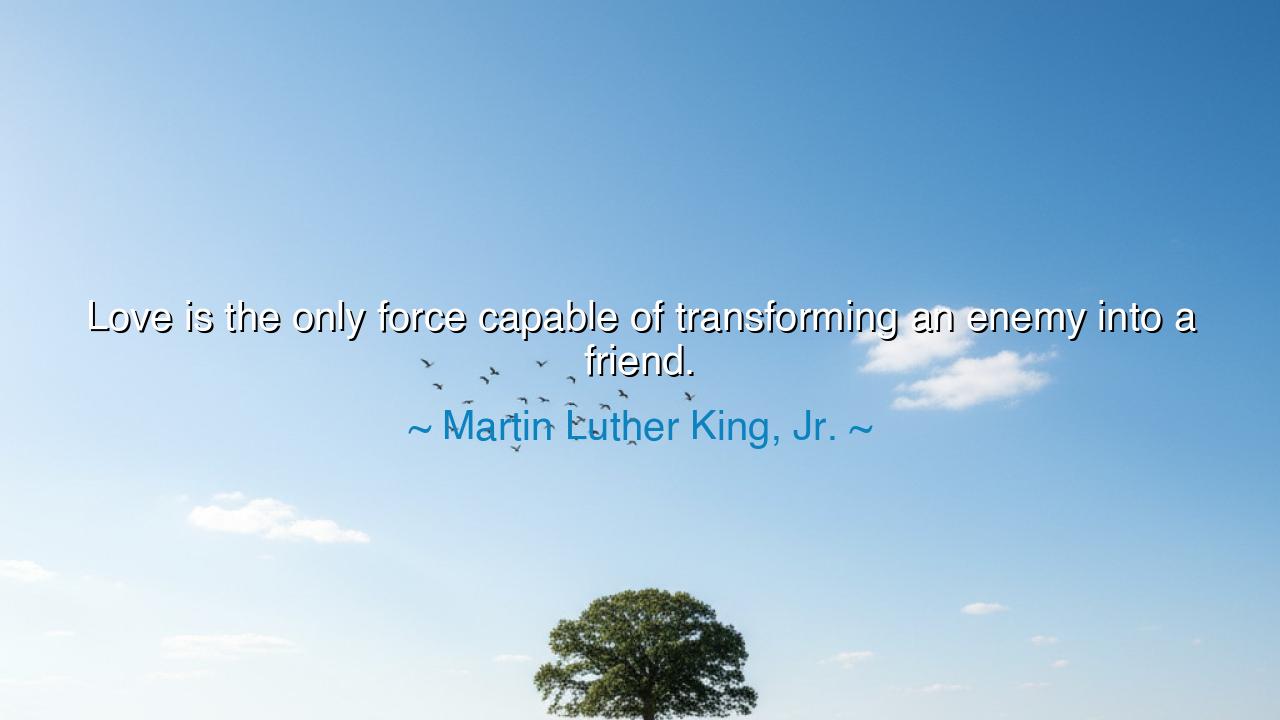
Love is the only force capable of transforming an enemy into a






“Love is the only force capable of transforming an enemy into a friend.”
Thus spoke Martin Luther King, Jr., the prophet of peace in an age of turmoil, whose words resound like thunder wrapped in compassion. In this sacred truth, King reveals the divine power of love—a power greater than hatred, sharper than vengeance, and more enduring than the sword. He declares that only love possesses the alchemy strong enough to turn hostility into harmony, to melt the ice of hatred and shape it into the warmth of friendship. For hatred may destroy a man’s enemies, but love transforms them; hatred ends a life, but love renews it.
The origin of this quote arises from King’s lifelong devotion to the philosophy of nonviolence, drawn from the teachings of Jesus Christ and Mahatma Gandhi. King believed that every soul, no matter how darkened by prejudice or rage, still bears within it a spark of divine worth. To awaken that spark, he said, one must not answer hate with hate, but hate with love. During the Civil Rights Movement, when King faced imprisonment, insult, and threat of death, he did not call for revenge but for reconciliation. His conviction was not mere sentiment—it was a deliberate act of courage. For to love one’s enemy is not weakness; it is the highest form of strength, the mark of a heart that has conquered itself.
The meaning of his words pierces the core of human nature. We are born into a world of division—tribe against tribe, creed against creed, man against man. Fear breeds hatred, and hatred breeds destruction. Yet King teaches that this cycle can only be broken by the transformative power of love. For love alone changes not the circumstance, but the soul. When we answer cruelty with kindness, we force the oppressor to confront his own conscience. When we choose compassion over revenge, we deny hatred its victory. Love does not ignore evil—it overcomes it, not by yielding, but by transforming the heart that harbors it.
History offers radiant proof of this divine truth. Consider the story of Nelson Mandela, who, after twenty-seven years of imprisonment, emerged not with bitterness but with forgiveness. When asked why he did not hate his captors, Mandela said, “Hating them would still keep me in prison.” He sought peace, not revenge, and through his grace, he transformed a nation torn by racial hatred into one capable of healing. His enemies became his partners in building a new South Africa. Like King, Mandela understood that love is not passive—it is the mightiest of weapons, one that disarms not by force, but by awakening humanity in those who had forgotten it.
King himself lived—and died—by this creed. When white supremacists bombed his home, nearly killing his family, he did not call for retaliation. Standing before an enraged crowd ready for vengeance, he spoke calmly: “We must meet hate with love.” His words turned fury into peace. Again and again, when struck, he refused to strike back, and in doing so, he transformed enemies into allies, bigots into believers. The power of his love was not in softness, but in its unyielding strength—the strength to rise above the very hatred that sought to destroy him.
In his quote, King uses the word transforming, not merely changing. For transformation is a rebirth of the spirit—it is the turning of stone into flesh, darkness into light. To love one’s enemy is to perform a kind of moral miracle: to see in another the same divine essence that lives in oneself. This is not easy. It demands courage to forgive when wounded, wisdom to see beyond offense, and faith to believe that goodness lies buried beneath cruelty. Yet King assures us that only through such love can humanity be redeemed.
Let this, then, be the lesson: when you face hatred, do not mirror it—transcend it. Do not answer anger with anger, for that only deepens the abyss. Instead, answer it with love, the one power that turns discord into understanding. Begin not with nations, but with hearts. Forgive the insult; extend the hand that was once clenched; speak softly where others shout. For each act of love, however small, becomes a seed of peace that will one day blossom into friendship.
Thus, the wisdom of Martin Luther King, Jr. endures as both prophecy and commandment: “Love is the only force capable of transforming an enemy into a friend.” It is the eternal flame that lights the darkness of hatred, the sacred fire that forges peace from pain. And those who wield it—who dare to love where others would hate—become not merely peacemakers, but the builders of a new world, where enemies become brothers, and love reigns as the law of life.






AAdministratorAdministrator
Welcome, honored guests. Please leave a comment, we will respond soon